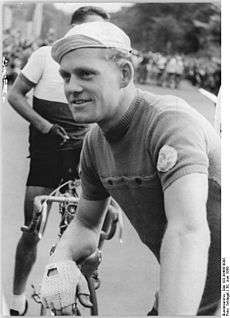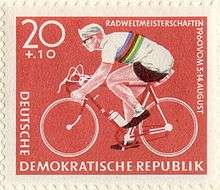Gustav-Adolf Schur
|
Schur before a race in 1956 | |||||||||||||||||||||||||
| Personal information | |||||||||||||||||||||||||
|---|---|---|---|---|---|---|---|---|---|---|---|---|---|---|---|---|---|---|---|---|---|---|---|---|---|
| Full name | Gustav-Adolf Schur | ||||||||||||||||||||||||
| Born |
23 February 1931 East Germany | ||||||||||||||||||||||||
| Height | 1.75 m (5 ft 9 in) | ||||||||||||||||||||||||
| Weight | 73 kg (161 lb) | ||||||||||||||||||||||||
| Team information | |||||||||||||||||||||||||
| Current team | Retired | ||||||||||||||||||||||||
| Role | Rider | ||||||||||||||||||||||||
| Major wins | |||||||||||||||||||||||||
|
1955 Peace Race 1959 Amateur World Road Race Champion | |||||||||||||||||||||||||
Medal record
| |||||||||||||||||||||||||
|
Infobox last updated on 17:18, 12 January 2009 (UTC) | |||||||||||||||||||||||||
Gustav-Adolf "Täve" Schur (born 23 February 1931 in Heyrothsberge, Province of Saxony) is a former German cyclist and one of the most popular sportspeople in East Germany. He was the first German to win the amateur competition of the World Cycling Championships and the Peace Race. Between 1959 and 1990 Schur was a member of the Volkskammer, the East German parliament.
Life
"Täve" Schur (a shortening of Gustav) grew up near Magdeburg. He only took up cycling aged 19 and won the highest honors an amateur cyclist could reach. Schur won the East German championships 6 times in that period and won the GDR tour 4 times. In 1953 he had a great stake in East Germany winning the blue jersey of the best team at the Peace Race. His real breakthrough came in 1955, however, when he was the first East German to win the Peace Race, considered the most prestigious amateur stage race. Schur won the Peace Race once more in 1959.[1][2][3]
As a member of the Unified Team of Germany he won a bronze medal in the team time trial at the 1956 Summer Olympics in Melbourne and a silver medal at the 1960 Summer Olympics in Rome,[3] at a time when the impact East Germany would have in later Olympic Games was not foreseen yet. Between 1955 and 1963 Schur studied at the DHfK Leipzig and finished with a diploma as coach. In late 1950s Schur was at the height of his form, as proven by his two wins at the amateur road race at the road world championships in 1958 and 1959, he was the first amateur to defend his title.[2][3]
Schur reached the summit of his popularity by not winning, however: At the 1960 UCI Road World Championships that took place at the Sachsenring, Schur was favorite to defend his title again, but instead he let his teammate Bernhard Eckstein pass who eventually won the race. This selfless gesture capped Schur's myth, the dimensions of which can be sensed if one considers the results of a survey conducted after the end of East Germany: here Schur was voted greatest East German sports personality of all time, 25 years after ending his career.[3] Schur was selected as East-German Sportspersonality of the Year nine times in a row from 1953 to 1961.
His son Jan (born 1962) won an Olympic gold medal in the team trial at the 1988 Summer Olympics,[4] together with Uwe Ampler, Mario Kummer and Maik Landsmann.
Schur was more deeply involved politically than other sports people in East Germany. Between 1959 and 1990 he was a member of the Volkskammer. After German reunification he kept to his views and joined the SED successor party PDS and was a member of Germany's parliament, Bundestag, between 1998 and 2002.[3]
Schur is also a member of the "Kuratorium Friedensfahrt Course de la Paix e.V.", and works to keep the traditional race alive.
In 1992 Schur opened a bicycle store in Magdeburg that is now run by his other son Gus-Erik Schur. "Täves Radladen" supports the bicycle racing club "RC Lostau" and takes part in races all over Europe under the name "Team Täves Radladen".[5]
In May 2012 Schur re-rode two stages of the 1955 Peace Race, as part of the Alf Buttler Peace Race Tribute Ride.
Honors
In 2005 the planetoid 2000 UR was named after Schur. It now has the official designation (38976) Täve, circling the Sun on an orbit between Mars and Jupiter.
References
| Wikimedia Commons has media related to Täve Schur. |
- ↑ "Course de la Paix (Tch) – Cat.2.2" (in French). Retrieved 25 January 2010.
- 1 2 Gustav-Adolf Schur. cyclingarchives.com
- 1 2 3 4 5 Gustav-Adolf Schur. sports-reference.com
- ↑ Jan Schur. sports-reference.com
- ↑ Interview mit "Täve" Schur, Magdeburger Radsportidol (4 February 2010) pp. 4–7

